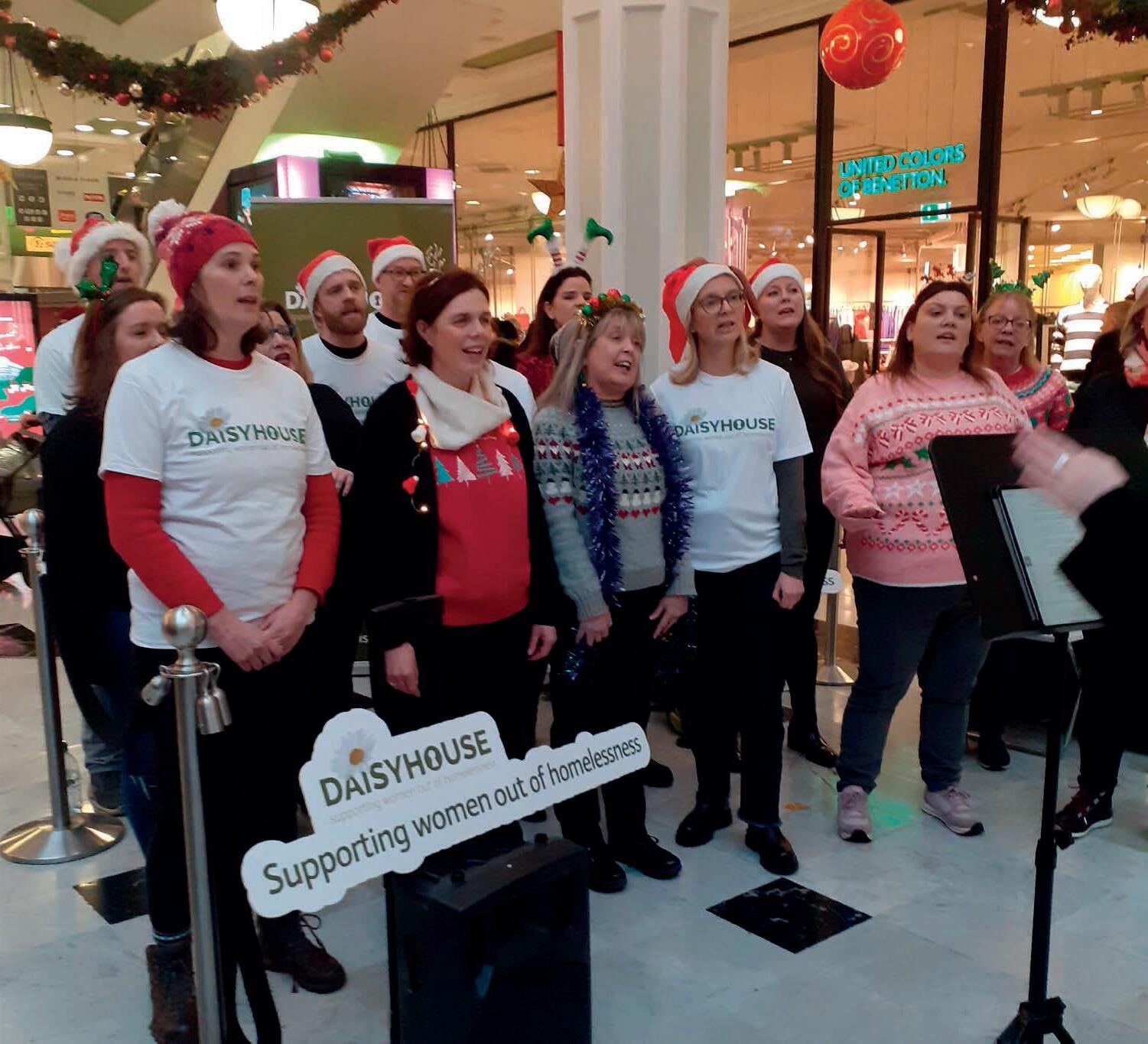










Our mission is an Ireland where vulnerable homeless women seeking to break the cycle of homelessness are nurtured and supported to develop their skills and abilities that enable them to make the right choices that support their independent living.
Our vision is to support vulnerable homeless women break the cycle of homelessness on their own terms
Our values are our guiding principles driving what we do and how we work. They set standards that our clients, staff and stakeholders can expect from us. They help us to manage performance, recruit new staff and recognise and reward good work. Our values inform a positive and proactive culture that will help us to achieve our strategic objectives.
They are as follows:
Empowerment: We empower people to get back on their feet in a safe and confidential, collaborative environment. We give a ‘hand up’ –not a ‘hand out’.
Mutual Respect: Mutual respect is a core value of Daisyhouse in how we deal with our clients, staff, board members and partners.
Advocacy: We advocate on behalf of our clients to ensure that they secure appropriate services and housing.
Integrity: Daisyhouse aims to fulfil its Mission with the highest level of integrity, demanding full transparency, accountability, and the utmost professionalism from its board, executive and staff in all its dealings.
Collaboration: the ability to work cohesively with all.

2023 CONTINUES TO BE DEFINED AS A PERIOD OF CONSOLIDATION AND CHALLENGE FOR DAISYHOUSE. THE PRINCIPAL CHALLENGE REMAINS THE CONTINUED HOUSING CRISIS, EXACERBATED BY THE ON-GOING WARS IN THE MIDDLE EAST AND UKRAINE. DAISYHOUSE CONTINUES TO MAINTAIN SERVICES AND CONSOLIDATE ITS BASE FOR THE PLANNED GROWTH AND DEVELOPMENT OF ITS INCREASINGLY NEEDED SERVICES.
Our strategic plan continues to be progressed in consultation with the key public agencies and funders who support the goal of increased and extended services. Our strategic plan to double the size and scale of our facilities and the number of clients that we serve over the next five years remains our principal goal.
We have increased our Board numbers to expand the range of expertise and contacts available to Daisyhouse. This will be invaluable as support and drive for our CEO to progress necessary developments to achieve our stated goal.
Our clients, being both homeless and recovering from other challenges, including addiction and a combination of traumas, continue to benefit from our programme and our public health funders are supportive of our plans to increase our services substantially.
The Daisyhouse model will continue to have a positive impact on addressing the problems, issues and challenges in the sector through our promise and commitment to continue to deliver the best outcomes for the clients that we serve.
Board membership
2023 saw the planned growth and extension of the Board in the latter part of the year.
Dr Aislinne Freeman and Eoin Kearney were appointed in September 2023 while Ruth Baldwin and Patricia Heavey joined in November 2023. This has brought an increase in energy and commitment at both Committee and Board level.
Our board members are quietly dedicated and committed to both the maintenance and development of Daisyhouse as a positive force for women in crisis through homelessness and other afflictions. Through their counsel and input the capacity for clients to exit homelessness and enter a path of positive development continues. This drives the confidence and expectation that Daisyhouse will grow and develop as a positive force for our clients who commit to exit homelessness and create better lives for themselves, their families and their communities.
Operations
Again, the operational environment of the unparalleled crisis in homelessness was evident for Daisyhouse residents in our inability to progress those clients who have completed the eighteenmonth programme but have been unable to leave our facilities due to the unavailability of alternative accommodation.
Recruitment and retention of staff continues to be the challenge of all relatively small operations in a period of full employment and opportunities for improved salaries and conditions outside the sector. Happily, the start of 2024 sees us in a better situation than we have been for more than five years with a full quota of appropriately qualified staff.
The CEO, Ena Norris, manages all elements of operations in Daisyhouse quietly and effectively, with the focus firmly on the development and progress of Clients whilst managing key relationships with funders, donors and other third parties. In addition, our regular meetings, updates and communications ensure that the Committees and the Board were kept well informed of any significant developments and changes and that best practice is always adhered to.
The relationship with the HSE and with other public service funders continues to be managed and monitored to ensure optimal support for all existing programmes and proposed developments.
Fundraising continues to be negatively impacted through challenges in recruitment. Meanwhile, critical relationships with existing and prospective philanthropic supporters are being managed and developed to ensure that they are kept informed of the essential nature of the contribution they make and the impact that has.
The Strategic Plan success is dependent on both the retention and growth of income and revenue and 2023 has seen some substantial progress in additional opportunities been developed.
Costs continue to be tightly managed and controlled and this resulted in a breakeven situation for the year which enables retention of the desired revenue reserve levels that the Board have set as a target.
Board Members make a genuine commitment and contribution to drive the effectiveness, growth and development of Daisyhouse ensuring that both Governance and Strategy are kept at the fore of everything we do.
It is both humbling and rewarding to be nominated as Chairperson. The challenges faced by our clients do not decrease. The services of agencies such as Daisyhouse make significant positive differences within our society. We support the work that will minimise the deprivation and challenges our clients’ experience to enable them to make the changes so that can exit the blight that is homelessness.
The work of the Board and the services of Daisyhouse are only possible through the commitment, presence and support of the staff of Daisyhouse. Our CEO Ena Norris, with her select and determined team meet the challenges, demands and needs: whether it is the needs of clients, the requirements of the HSE and funders and regulators, or any of the other demands that arise in such a complex and challenging environment. Our appreciation and regard for them is difficult to overstate. T hank you.

Alan Tracey, Chairperson
It is my privilege to present the 2023 Annual Report of Daisyhouse Housing Association CLG (‘Daisyhouse’). Within this report, you will read about some of the incredible women who come through the doors of Daisyhouse. These women are to the forefront of everything we do in Daisyhouse. I want to thank them for allowing me to share their journeys with you.
In 2023, Daisyhouse continued to provide crucial support to individuals experiencing homelessness, helping them rebuild their lives with dignity and hope. Our commitment to offering safe, supportive, and drug-free environments has remained unwavering, and our innovative programs have empowered many to take significant steps towards independence and self-sufficiency.
Our achievements this year would not have been possible without the dedication and hard work of our staff, volunteers, and Board of Directors. Their tireless efforts have ensured that our services not only meet but exceed the needs of our clients. I am particularly grateful for the leadership and strategic guidance provided by our Board, whose vision and governance have been instrumental in driving our mission forward.
We have also seen tremendous support from our corporate, philanthropic and community partners whose contributions have enriched the lives of our clients in countless ways. From on-site volunteering and staff collections to community-led initiatives like carol singing and the assembly of Christmas hampers, your generosity has made a tangible difference.
2023 saw us have a 100% success rate in no client relapsing into substance misuse, However, the chronic shortage of housing is causing our clients to have to remain in Daisyhouse longer than the stated eighteen months. This unfortunately is having a direct impact on people being able to enter substance misuse treatment as move-on beds such as those in our service are not readily available in order to move women through to the next stages of their recovery.
As we look ahead to 2024, we remain committed to our mission of providing high-quality, supported housing solutions and comprehensive care for those in need. We will continue to innovate, adapt, and strive for excellence in all that we do, ensuring that every individual who comes to Daisyhouse has the opportunity to rebuild their life and achieve lasting independence.
Thank you for your continued support and partnership. Together, we are making a difference. Your belief in our mission and your generosity have enabled us to create lasting change in the lives of our clients. As we move forward, we invite you to continue this journey with us, helping to build a brighter and more hopeful future for all.
Warm regards,

Ena Norris, CEO

Daisyhouse Housing Association was established 35 years. We are dedicated to addressing the diverse and complex needs of women experiencing homelessness and who are in recovery from substance misuse. We recognize that homelessness among women is often the result of a myriad of interconnected factors, ranging from domestic violence and sexual abuse to addiction, health issues, relationship breakdowns, and financial instability. These challenges can create a web of vulnerability, trapping women in cycles of despair and uncertainty. Our mission is to break those cycles, to provide not just shelter, but a sanctuary where women can heal, grow, and ultimately thrive. Central to our approach is the provision of supported temporary accommodation coupled with individually tailored personal support programs. These programs are designed to meet the unique needs of each woman, offering a holistic blend of practical assistance, emotional support, and empowerment. Over an 18-month period, we work tirelessly alongside our clients, helping them navigate the complexities of their circumstances and laying the foundation for a brighter future. A large part of our work with women who are mothers is family reunification so as to ensure that they are ready to become the primary care givers to their children once they leave Daisyhouse. But our support doesn’t end there. Recognizing that a successful transition out of homelessness requires more than just a roof over one’s head, we offer comprehensive resettlement programs. These programs equip women with the skills, resources, and confidence needed to rebuild their lives independently. From budgeting and job readiness to mental health support and life skills training, we leave no stone unturned in our efforts to empower women to reclaim their autonomy and self-sufficiency.
Referrals to Daisyhouse are facilitated through the Health Service Executive (HSE) and associated organisations, ensuring that our services reach those who need them most. Candidates undergo a thorough assessment process. Once accepted, candidates are welcomed into our community with open arms, their journey towards stability and independence carefully guided every step of the
way. Throughout their time at Daisyhouse, clients are encouraged to take an active role in their own recovery. Through individualized support plans, we empower women to confront the underlying issues that contributed to their homelessness, fostering resilience and self-awareness along the way. Our goal is not just to provide temporary relief, but to instil in each woman the confidence and resilience needed to navigate life’s challenges with grace and dignity.
In 2023, we provided support to eighteen individuals through our supported temporary accommodation programme. This service offers gender-specific, owndoor accommodation for women who are homeless after completing treatment, allowing them to continue their recovery journey. The programme spans eighteen months, during which residents are paired with a key worker who they meet a minimum of once per week. Residents are encouraged to take an active role in their care, with a strong focus on recovery, mental and emotional health, and meaningful engagement.
Our supported temporary accommodation is designed to provide a stable and supportive environment that bridges the gap between treatment and independent living. The importance of this phase cannot be overstated, as it allows women to rebuild their lives with the necessary support structures in place. The accommodation provided is genderspecific, ensuring that each woman’s needs are met in a safe and respectful environment. Each resident has their own door, promoting a sense of independence and privacy which is crucial for building self-esteem and personal responsibility.
During their stay, residents are paired with a dedicated key worker who uses the Outcome Star, a tool designed to help them visualise their progress and set achievable goals. This collaborative approach ensures that care plans are tailored to the individual’s unique needs and circumstances. The key worker and resident work together to focus on various aspects of recovery, including mental and emotional health, physical well-being, and the development of life skills.
A significant emphasis is placed on the meaningful use of time. Residents are encouraged to engage in daytime activities that promote personal growth and social integration. These activities can include participating in a recovery programme, volunteering, securing employment, pursuing education, or undergoing training. This engagement not only aids in recovery but also helps individuals build a routine and a sense of purpose, which are vital components of a successful transition to independent living.
Our programme requires residents to fully engage with all aspects of their care plan. Regular meetings with their key worker are essential, providing opportunities to discuss progress, address challenges, and adjust plans as needed. Additionally, residents have access to specialised counselling services provided by Daisyhouse, which offer critical support for dealing with the psychological and emotional aspects of recovery.
If, for any reason, a placement in Daisyhouse is not the right fit for a resident, our staff are committed to supporting them in accessing alternative services. This ensures that no one is left without support and that every individual has the best possible chance of continuing their recovery journey successfully.
In 2023, our programme saw remarkable success. Four residents transitioned from our supported temporary accommodation to long-term housing. All residents maintained sobriety throughout the year, an achievement that is virtually unheard of in early recovery housing. This 100% success rate underscores the effectiveness of our comprehensive, individualised approach. The four residents who moved on were all placed in long-term social housing, marking a significant milestone in their recovery and journey towards independent living.
Our supported temporary accommodation programme not only provides a crucial service for those in need but also demonstrates the profound impact of structured, empathetic support during one of the most challenging phases of recovery. We remain committed to helping more women achieve similar success in the coming years.
In 2023, Daisyhouse continued to be a hub of significant learning and development. Most individuals who come to Daisyhouse are already engaged in a drug-free structured day programme upon arrival. These programmes are often their first experience returning to structured education and training, typically lasting between six and twelve months. Upon completing their day programme, residents generally move on to some form of thirdlevel education or employment.
Daisyhouse supports this educational journey through generous donations from corporate sponsors dedicated to educational purposes. In 2023, we supported our residents in studying a variety of disciplines, including but not limited to:
• History
• Social Care (Level 6)
• Literacy and Numeracy
• Introduction to Construction Studies
• BA in Social Policy
• Pilates
• Addiction Studies
• Third Level Access Course at Trinity College
To facilitate these educational pursuits, we continued to provide essential resources such as laptops, books, and materials. Additionally, we supported residents with travel costs to their places of training or education. These opportunities significantly boost our residents’ self-confidence and enable them to rebuild their lives, creating brighter futures for themselves.
Out of the eighteen residents in 2023, seven participated in structured day programmes during the year. Additionally, eleven residents were employed, either part-time or full-time. This combination of education and employment helps our residents gain
practical skills, enhance their resumes, and develop a strong work ethic, all of which are crucial for their long-term success and independence.
The support provided by Daisyhouse ensures that residents have access to a broad range of educational opportunities, fostering personal growth and opening doors to new career paths. The success stories from 2023 highlight the transformative impact of structured support and education, demonstrating our commitment to empowering individuals to achieve their full potential.
In 2023, seven of the eighteen residents we supported were parents who benefited from our family reunification services. These residents had children in the care of the state or living with family members, allowing the parents time to address their personal issues and trauma while residing in Daisyhouse homeless accommodation. Some of these children have witnessed domestic violence, parental substance misuse, and may have experienced neglect, as well as emotional abuse. The primary wish for all the parents at Daisyhouse is to be fully reunited with their children, a process that is often long and complex, particularly for those with children in state care.
Every decision our residents make while at Daisyhouse is driven by the goal of reuniting with their children. Research shows that maintaining physical and emotional ties with biological parents is crucial for children in foster care, as it is generally agreed that living with their families is in their best interests. Daisyhouse staff work closely with parents to help them overcome issues that may affect their relationships with their children. This support includes one-on-one counselling, group work, parenting skills development, and assistance with meetings involving TUSLA social workers and staff.
Parents may gradually have contact with their children and begin addressing the negative impacts their children have endured. However, due to limited night staff and space, residents in our supported temporary accommodation cannot have their children stay overnight at Daisyhouse. To facilitate
family bonding, we occasionally arrange overnight stays in hotels and B&Bs for parents and their children, in conjunction with TUSLA when necessary. During these overnights, staff regularly check in with the parent to ensure everything is going smoothly. These overnight stays continue throughout the resident’s time at Daisyhouse, and staff maintain ongoing communication with TUSLA and other family members regarding the reunification process.
Securing appropriate accommodation for reunification poses a significant challenge. Many residents, due to their past traumas, are newly added to the local authority housing list and initially qualify only for one-bedroom accommodations, as their children are not currently residing with them or they don’t have overnight access when they arrive at Daisyhouse. To facilitate reunification, we work closely with the relevant local authorities to secure appropriately sized housing.
Through these efforts, Daisyhouse remains committed to supporting parents in their journey toward reunification with their children, providing the necessary resources and guidance to help them rebuild their families and create a stable, nurturing environment for their children.
Daisyhouse also operates as an Approved Housing Body, providing fifteen long-term properties that serve as permanent homes for our tenants. Twelve of these properties are located within the Dublin City Council area, with the remaining three situated in the Fingal County Council catchment area. Daisyhouse is responsible for the repair and maintenance of these properties, ensuring they remain safe and comfortable for our tenants.
Our staff offer ongoing support to tenants, especially during the initial move-in and transition period. This support is crucial for helping tenants fully integrate into their new communities, where they can feel safe and continue to rebuild their lives away from homeless services. Daisyhouse staff assist tenants with various needs, promoting a smooth transition and fostering a sense of belonging and stability.
In addition to maintenance and tenant support, Daisyhouse is responsible for addressing any anti-social behaviour and tenancy issues that may arise. Our commitment to maintaining a positive living environment ensures that all tenants can enjoy their homes without disruption.
All our long-term properties were fully occupied in 2023, reflecting the ongoing demand for stable, supportive housing and our success in providing a home for life for those in need.
Daisyhouse offers a comprehensive aftercare and postsettlement support programme for clients who move on from our facilities. We collaborate closely with landlords, other approved housing bodies and local authorities to secure safe and suitable accommodation for our clients. As clients progress through their programme and are ready to establish their own homes, our support team ensures that the housing conditions are appropriate, utilities and services are in place, and the rights and responsibilities of both tenant and landlord are clear and respected, facilitating a smooth transition to permanent, independent living.

Our resettlement support covers a wide range of services, including:
• Securing accommodation
• Arranging viewings
• Assisting with signing documents
• Setting up utilities
• Purchasing furniture
• Familiarizing clients with the local area
• Identifying new doctors and community supports (e.g., NA/AA)
This outreach support is provided, where practicable, for up to two years and is tailored to meet the specific needs of each client.
In 2023, we worked with six individuals through our aftercare programme, helping them transition successfully to independent living.
Daisyhouse provides an eighteen-month placement to women who are ready to live independently with a view to moving them into their own home. It is important that referral agents have completed a risk assessment and have assessed that the applicant is ready to live semi-independently as support staff work 9-5 Monday to Friday. An on-call system is in operation for out-of-hours but for emergencies only. If a potential client has medium to high support needs then Daisyhouse may not be in a position to meet their needs. .
The client must be over 18
drug and alcohol free for six+ months
no history/pending charges for arson, violence, sexual or children related criminal offences. This is due to the vulnerability of our client groups and children that maybe on-site.
The client accepts HAP as a move
has resided in an aftercare house, (directly leaving aftercare house to come to Daisyhouse) They must be registered as homeless with the DCC/DLRCC/FCC/SDCC
engaging in a day programme engaging in supports for their recovery
in need of low supports and mental health associated risks.
is not currently addressing charges or conviction.
in need of low supports and mental health associated risks.
If the referred client meets our criteria, they are placed on a waiting list. The “referring agency” is contacted and advised of same. Once a unit becomes available, the potential client is called for an assessment. If a client is successful following the assessment a date is arranged for them to move into Daisyhouse.

Breaking the cycle:
I grew up in an environment where addiction was present and even normalised. My mother was a chronic alcoholic along with many others of my extended family, this placed a lot of responsibility on me at a young age to have to look after myself and my family members. From having a challenging upbringing, experiencing trauma early on in life and from being in abusive relationships, I ended up also going on to abuse alcohol as a way of coping with life.
Part of why I chose the path of recovery is because I did not want that life for myself, I did not want that to be my destiny, I wanted to break this cycle of addiction. I wished to build a life worth living, for me and also for my son. I had tried recovery before, but this time around was different and I was going to do it right.
Daisyhouse:
As I went through treatment the apartment I was renting was being sold, this meant I had no choice but to go to a short term recovery house afterwards. However, I believe this really helped to give me the best possible chance at recovery as I was not going back to an apartment just to isolate. However, in this recovery house we couldn’t get back to employment as we had to be in a day program and they were strict on curfews etc. so it was hard in there to keep moving forward with my life. This changed when I moved to Daisyhouse as it opened up so many doors for me, allowing me to live independently, get back to employment and start building a life for myself.
Living in Daisyhouse meant I could bring my son over, even though he doesn’t live here it is still his home when he is here with me and I can sense that he feels comfortable that he is in such a safe space. We can chill out and spend time together which is really important for building our relationship, I really value that I can have this one to one time in my own space, rather than be in somebody else’s home. I also think it is really important for him to be able to see that his mother is safe and in a nice environment with a roof over her head. I also have other family visiting me in Daisyhouse and I meet with my fellowship sponsor here too.
I am hoping to move on from on in the future and have my own place but Daisyhouse is the perfect stepping stone on a journey towards this. I really see the value of Daisyhouse, especially for anyone who has struggled with living independently before, they have that added bit of support here, even if they don’t always need it, they know it is there. You are also trusted by the staff and given great flexibility to come and go and to have your own recovery structure. Having that freedom is what really builds your self-trust and self-worth as you become selfreliant and do not become dependent on other people or services. Living with this freedom and flexibility gives you the assurance that when the time comes to move on and live in independent accommodation, you will be ready.
Although I am content in where I am in life, I still have a vision that I am working towards. Since moving to Daisyhouse I decided to go back to college and train in the area of addiction. In the future I would love to be working in a job where I am helping others with their addiction and on their recovery journey as I believe I can give hope to a lot of people. There are many people out there who think change is never possible, they identify themselves by their addiction “I’ll always be an alcoholic” but change is possible and I’m an example of that. In my experience a lot of people in addiction just never had anyone around them to build up their self-worth and esteem or tell them that they were able, I see myself working in this area and helping people to build this in themselves and give them hope for their future.
Life is never perfect, but right now the stress in my life is ‘good stress’, in terms of having a job that is demanding and also having to have college assignments deadlines hanging over me. I’m able to manage the stress in my life, I have a lot of support here, from the staff but also from the women living around me. Daisyhouse is a great support for women in recovery.


Key-working:
I found I really clicked with my keyworker from the beginning, we have done a lot of work together and she has helped me to challenge myself in areas of my life that I had really struggled with, particularly in areas like literacy work and in learning to be more trusting of others. Although we’ve worked hard, I find it is not all about the ‘work’. It can also just be about popping down to the office when I have some free time and having the banter and a few laughs. I don’t see the staff every single day, but it’s really helpful to know there is staff onsite if I need support with something or even just to come out and have a chat, a laugh or to get something off my chest. If I am struggling with something on the day, it’s really helpful to come down and talk because then its ‘lifted off me’, and because I know they will listen.
Positive Change:
For people like myself with a background of addiction, change is not something we like. But I believe my life has been changing in so many positive ways. Since moving to Daisyhouse I have returned to work full time. Getting back to work has given me so much because it comes with a feeling of getting back to society too and learning to communicate with people again, including people outside of the recovery/addiction circle. Another change has come from living amongst the women here, it was always going to be a challenge for me living with women as I have always struggled to trust women in the past due to my childhood upbringing but I have noticed since living in Daisyhouse that I have become more open and trusting with the women around me. The most important change however, has been developing the relationship with my children again which has allowed me to feel like a mother again.
Family:
It means a lot to me that I can bring my son to Daisyhouse on visits, it’s really important to be able to bring your child to where you’re living because in a lot of other places you just can’t. He loves coming up here, I can cook for him, we can hang out in the back garden and he loves going to the local park. I have had to work hard to get him back in my life and at times I did not think it would be possible. Living in Daisyhouse has given me a solid base to be able to work on my relationship with my son and get him back in my life for good.
Living skills:
I think the fact that we are paying rent and paying bills here is really important, as it’s building you up for when it’s your time to move on. You get support from the staff here but things are not just done for you. It is down to you to do the work and to keep to your routine and structure. Some people aren’t used to having to pay bills, being consistent with their rent and having a weekly structure but it’s an important part of daily living for people in recovery.
Not enough female services:
Daisyhouse is the only place I can think of that’s a female only ‘recovery house’. I think we need more female services because a lot of women out there, particularly mothers like myself, might not engage in recovery services because they are afraid. They may think that Tusla are out to get them and to take their kids from them or maybe that ex partners will use it against them to take their kids. I think if we had more services and more women knew what help was out there and how to access it, they would be less afraid. Daisyhouse is a great example of a female support service, because although we have support from the staff we also have support from one another. This can go a long way because some people need that companionship in recovery, someone to go to a meeting with or somebody to try a new activity with. It is great to have other women who are strong in their recovery living just next door, I believe I can be a great support for them too, particularly those who are new to Daisyhouse or new to recovery.
Lately, I have been doing some work with women who are homeless through my work, many of whom are rough sleeping. I do some beauty work with them, we do face masks and paint their nails and I can see how much it means to them to be looked after and taken care of. For women in addiction and women in recovery, care is what they need and a service like Daisyhouse has a lot of care.
Finding myself:
Daisyhouse has given me a great opportunity to settle into a drug free life. I feel like now I’m finally finding the person who I am, I’m realising what I like and what I don’t like, and what I love.
Journey to Daisyhouse
My addiction began early in life, it was at the age of fourteen when I began using substances. I had been in and out of addiction throughout my life but when I ended up in prison after receiving a big sentence for drug related crimes, I decided then that I would get the treatment that I needed to address my addiction and from there I felt determined to create a better life for myself. From prison I went straight to treatment and I began this journey in recovery. After spending about six months in a post treatment recovery house I was blessed with getting a bed in Daisyhouse. Daisyhouse has been such a positive environment for me, it has brought a lot of stability to my life, allowing me to feel safe and secure in my own space while I continue to work hard on my recovery. Having my own space and being close to my support network has helped me to keep growing, keep moving forward and ultimately to flourish.
The Staff:
The keyworkers and staff in general at Daisyhouse have always been so helpful and supportive in my time here. They are always there for you even if it is just for the small things like getting a form filled out or chatting about your day.
Moving on:
Recently I have been blessed with my ‘forever home’, a permanent accommodation for life. For me this is the final chapter of my journey, from prison to treatment to recovery based homeless services and now finally to a place I can call my own. I have never felt more ready or more prepared for this next chapter of my life. However, it felt at times that this moment would never arrive. There were people around me moving on from Daisyhouse and it felt as though my time would never come. I felt like in all other aspects of my life I was progressing but housing had felt like a standstill. I had been doing all the right things in terms of applying for properties and making sure I was ready to move on, but progress was slow. This was understandable though due to the housing crises we are in and the lack of suitable options for people trying to rent with HAP. It meant a lot to me that staff in Daisyhouse understood this and kept reassuring me that my time would come as at times I felt I was losing hope that it would happen at all.
Gratitude:
If I were to sum up my feelings towards Daisyhouse in one word it would be ‘gratitude’. I will be forever grateful for my two years’ experience here as it laid the foundation for me to keep moving forward in life and create a brighter future for myself.

At Daisyhouse, we provide more than just a place to live; we offer individuals the tools and support they need to rebuild their lives. Our clients learn how to set healthy boundaries, overcome past traumas, and establish and maintain supportive relationships and networks. These skills are crucial for enhancing their personal confidence and improving their ability to communicate effectively with others. This empowerment allows them to take significant steps towards building a new life, free from the difficulties and challenges of their past.
Our holistic approach recognises that the provision of a safe place to live is only one aspect of the comprehensive support needed for successful rehabilitation and reintegration. At Daisyhouse, we offer gender-specific accommodation in an alcohol and drug-free environment, ensuring that clients have a stable and supportive space to focus on their recovery. The ongoing support and time invested in each individual play a crucial role in their ability to rebuild their lives and move towards independent living.
This support extends beyond their time at Daisyhouse. As clients prepare to move on, we ensure they have a robust and client-led tenancy sustainment plan in place. This plan includes:
• Guidance on maintaining their new homes
• Strategies for managing finances and household responsibilities
• Continuous emotional and psychological support
• Assistance in accessing community resources and services
Our aim is to ensure that clients not only find a new place to live but also gain the skills and confidence to sustain their tenancies. By doing so, we help them avoid the risk of relapse and the possibility of re-entering the cycle of homelessness. Our follow-up support is flexible and can be provided for up to two years, adapting to the unique needs of each client.
Additionally, we work closely with various stakeholders, including landlords, other approved housing bodies, and local authorities, to secure safe and suitable accommodation for our clients. This collaborative effort ensures that the transition to independent living is as smooth as possible. We assist clients in every step of this process, from securing housing and setting up utilities to purchasing furniture and integrating into their new communities.
By supporting clients in such a comprehensive manner, Daisyhouse not only helps them overcome immediate challenges but also lays the foundation for long-term success. Our impact is seen in the improved quality of life and the newfound stability of our clients, who move forward with a renewed sense of hope and possibility. This holistic support system ensures that they can continue to thrive independently, free from the constraints of their past struggles.
In conclusion, the impact of Daisyhouse extends far beyond providing temporary shelter. We empower individuals to rebuild their lives with confidence, resilience, and a strong support network, enabling them to achieve lasting independence and avoid future homelessness. Our commitment to comprehensive, clientcentered care is what truly makes a difference in the lives of those we serve.
Daisyhouse is committed to maintaining its properties to the highest standards, as this is essential for delivering excellent service to our clients. We have implemented a stock condition survey, which appraises the current condition and future lifespan of various elements and components of our housing assets. This survey provides a comprehensive overview of each property’s condition and estimates the expenditure needed to maintain them at a high standard over the next 30 years.
Stock condition surveys serve as crucial business planning and asset management tools for housing associations. They inform us of the future maintenance needs of our housing assets, allowing us to plan more effectively. As a result, Daisyhouse can ensure that our properties remain safe and comfortable for our clients. These surveys also help us establish an appropriate sinking fund to cover necessary maintenance work.
In 2023, Daisyhouse utilized insights from the stock condition survey to make significant improvements. We replaced six kitchens in our long-term properties and upgraded twenty-two windows in our supported temporary accommodation with triple glazing. This upgrade reduces noise pollution and heat loss, enhancing the comfort and energy efficiency of these homes.
Daisyhouse continues to perform emergency, routine, and cyclical repairs across all our properties, ensuring that they remain in excellent condition and provide a safe, comfortable environment for our clients. Our proactive approach to property maintenance is integral to our mission of supporting individuals as they rebuild their lives.

In 2023, Daisyhouse saw a vibrant resurgence in fundraising and volunteering activities after a hiatus due to the global covid pandemic. Our dedicated volunteers, drawn from both the corporate sector and the community, made a significant impact on the lives of the people we support. We are committed to ensuring that all volunteers have a rewarding experience and achieve their personal volunteering goals.
Our corporate staff engagement programme was particularly successful, with over one hundred individuals participating. This programme includes on-site volunteering tasks such as painting, gardening, and also organising staff collections, especially during the Christmas season. Additionally, many community members contributed their time and talents, organising activities such as carol singing, movie evenings, and assembling Christmas hampers. Our corporate partners include Sky Ireland, Pinergy, Benefit, Google, Doyle Hotel Group, Tenable Security, Tesco Ireland.
We extend our heartfelt thanks to everyone who generously shared their time, skills, and expertise with us. Your efforts are invaluable in helping Daisyhouse continue its mission of supporting individuals in rebuilding their lives.




Daisyhouse Housing Association CLG (‘Daisyhouse’) is a Company Limited by Guarantee, without a share capital under the Companies Act 2014. It was incorporated on 3 February 1989 and its registered number is 139811. Daisyhouse was granted charitable status for taxation purposes by the Revenue Commissioners. Our charity number is CHY 9669 and we are registered with the Charities Regulator; number CRA 20024185. All income is exclusively used to promote the charitable objectives of the company. We comply with Statements of Recommended Practice (Financial Reporting Standard 102 and the Statement of Recommended Practice, Housing SORP 2018).
Registered Office- 6 Emor Street, Portobello, Dublin 8, D08K3VF
Auditors: Crowleys DFK, 17 College Green, Dublin 2, D02 V078
Solicitors: Ryans Solicitors, 46 Harrington Street, Portobello, Dublin 8, D08YFN7
Bankers: Allied Irish Bank, 61 South Richmond Street, Dublin 2, D02 H282
Directors
The Directors serving during the year and since year end were as follows;
• Alan Tracey (Chairperson)
• Daniel Buttle (resigned 17th January 2023)
• Michael Harrington (resigned 4th June 2024)
• David McCabe (Company Secretary)
• John Driver (resigned 9th May 2024 Treasurer)
• Sarah Colgan
• Ruth McCourt
• Dr Aislinne Freeman (appointed 18th September 2023, resigned 9th May 2024)
• Eoin Kearney (appointed 18th September 2023)
• Patricia Heavey (appointed 20th November 2023)
• Ruth Baldwin (appointed 20th November 2023)
Daisyhouse is committed to upholding high-quality
standards in governance and management. The organisation is overseen by a voluntary Board of Directors, who provide leadership and robust governance. The Board reviews and approves the strategic plan and company policies, monitors performance, ensures the operation of an appropriate system of financial control, and ensures compliance with relevant laws and regulations. In 2023, the Board met eight times, with four of these meetings conducted on-line.
Newly appointed Directors receive a formal induction and comprehensive briefing documents to familiarise them with the company’s operations, management, and governance structures. Following a Board review and skills audit conducted with Boardmatch in 2022, the Board actively recruited new members in 2023, welcoming four new Directors to enhance its expertise and leadership capabilities.
The Board delegates the day-to-day operations of Daisyhouse to the CEO, who is not a Board member. The CEO manages the charity’s operations with delegated responsibilities to the staff team.
As a registered charity, Daisyhouse regularly reviews all activities and governance practices to ensure compliance with the Charities Governance Code. As a registered Approved Housing Body, we adhere to the governance standards set by the Approved Housing Bodies Regulatory Authority (AHBRA). In 2023, we submitted the required annual return of compliance to AHBRA.
Daisyhouse Housing Association is a complex organisation in relation to the Code and as such must satisfy forty nine standards based on six principles.
1) Advancing charitable purpose
2) Behaving with integrity
3) Leading people
4) Exercising control
5) Working effectively
6) Being accountable and transparent
Board Member Meeting Attendance 2023
Board Member 2023 Board Member Attendance
Alan Tracey 8/8
Daniel Buttle 0/8 ( resigned 17th January 2023)
Michael Harrington 8/8
David McCabe 6/8
John Driver 7/8
Sarah Colgan 6/8
Ruth McCourt 7/7 (appointed 21st March 2023)
Dr Aislinne Freeman 2/2 (appointed 18th September 2023, resigned )
Eoin Kearney 2/2 (appointed 18th September 2023)
Patricia Heavey 1/1 ( appointed 20th November 2023)
Ruth Baldwin 1/1 (appointed 20th November 2023)
There were three sub-committees in operation in 2023 - Governance, Audit and Risk and Funding and Fundraising.
The Audit and Risk Committee reviews the effectiveness of the organisation’s internal financial controls and procedures, oversees the external audit process from planning to completion and recommends the financial statements to the Board for approval. The committee also oversees our risk management process (further details in our Audited Accounts and Directors Report for 2023 and compliance with various legal and governance requirements. The Corporate Risk Register is a standing item on the agenda at every Audit and Risk Sub Committee meeting.
There were no political donations in 2023, and as a result, no disclosures are required under the Electoral Act, 1997. As required under the Regulation of Lobbying Act 2015, Daisyhouse now records all lobbying activity and communications with Designated Public Officials (DPOs). It has made the returns and submissions required by the Act.
The Board of Daisyhouse has a legal obligation to act in the best interests of the charity at all times and to avoid situations where there may be a potential conflict of interest. All new Board members complete a Register of Interests form and sign a Declaration of Compliance with Daisyhouse’ s Conflict of Interest Policy. Conflict of Interests are a standing item on the agenda of each Board meeting. Agendas for each Board meeting are circulated in advance for review. The Chairperson asks at the start of each Board meeting if anyone has a conflict of interest that needs to be declared. Any conflicts are recorded in our conflicts of interest register. There were no conflicts of interest recorded in 2023.
Daisyhouse is dedicated to achieving the highest standards and best practice in fundraising. We are fully committed to achieving the standards contained within the Guidelines for Charitable Organisations on Fundraising from the Public, to ensure that we undertake our activities with respect, honesty and integrity; and that we are transparent and accountable in all our actions. Our Donor Charter details our commitment to our donors and how we conduct our fundraising practices and activities.
Alan Tracey- Chairperson
A Chartered Accountant, Alan is Principal Business Advisor with Knowledge Business Systems, previously employed as Financial Controller in a number of businesses, including not for profit organisations. Alan has held roles as Non-Executive Director with a number of commercial organisations and he has supported voluntary and charitable organisations in a voluntary capacity. Alan was appointed Chairperson of Daisyhouse at the AGM in September 2020.
Daniel Buttle
Danny has spent the last 15 years working in technical operations and service management roles, primarily dealing with government and large corporate customer segments. During this time, Danny has worked in a combination of small agile companies and some of the largest employers in the world. Danny’s current role is as Operations Manager in Amazon Web Services. In his career, he has been a keen participant in Diversity and Inclusion initiatives both in Ireland and globally. He holds a BSc. in Computer Applications from Dublin City University. Danny resigned as a director on 17 January 2023.
Michael Harrington
Michael is a real estate agent with over 30 years’ experience in the Irish property market. Previously a director of HWBC and CBRE Ireland, he set up Harrington Retail, a niche advisory practice in 2013. A Chartered Surveyor, Michael holds a Diploma in Property Economics from TU Dublin, a BSc in Surveying and an MBA from Trinity College Dublin. Michael was appointed as a Director in July 2020.
David McCabe- Company Secretary
Dave is the Iarnród Éireann Company Secretary and over the past eight years has worked in a variety of corporate governance and company secretarial roles for semi-state, private entities and publicly listed companies. Prior to this, Dave devilled as a barrister on the southern eastern circuit and provided contractual legal research services to governmental and non-governmental organisations. Dave holds a BA in Legal Studies and Business from Waterford Institute of Technology, a Barrister-at-law degree from Kings Inns and a MSC in Management and Corporate Governance from Ulster University. Dave was appointed as a Director and Company Secretary in January 2021.
John Driver
John is a Tax Director in Grant Thornton Ireland with a focus on the financial services industry and works across a broad range of clients within banking, insurance, aviation and asset management. Prior to specialising in tax, John worked in analytics for a number of years within one of Ireland’s pillar banks and has gained industry experience in a number of Ireland’s leading financial institutions. John is a member of the Irish Tax Institute (ITI) and a member of the Association of Chartered Certified Accountants (ACCA). He holds a Masters of Science (MSc) degree from DCU and a Bachelor of Science (BSc) degree from Maynooth University.
Sarah Colgan
Having studied at Trinity College, Sarah began her career working in television and entertainment in London. She moved from MTV to the BBC before returning home to develop new television formats and produce prime time programming for RTÉ. She established Dublin-based creative advertising agency Along Came A Spider in 2014 and, in 2018, founded and led a national movement called 20×20 which changed the landscape for women in sport, winning several national and European awards.
Ruth McCourt
Ruth has worked in the charity and non-profit sector for over a decade in a variety of areas including child welfare and protection, sexual and gender-based violence, and European affairs. She currently works for the Irish Council for Civil Liberties and is Director of Communications and Development. Ruth holds a BA from Trinity College Dublin and an MA from Dublin City University, as well as a number of further postgraduate qualifications.
Dr. Aislinne Freeman
Aislinne began in the health sector as an academic, later advising the World Health Organization on policy and guidelines. She transitioned to business, working with EY and Grant Thornton, and is now a Global Transformation Associate Director at Novartis. Aislinne holds a Doctorate in Psychology, an MBA from Trinity College, and certifications in Agile, PRINCE 2, Lean Process Improvement, and Change Management. She was a Non-Executive Director for the Saolta Hospital group (2017-2020) and is deeply committed to social justice and supporting vulnerable women in Ireland.
Eoin Kearney
Eoin is Global Operations Lead for Harmful Content (Dangerous Organizations, Suicide, Credible Threats of Violence and Live Content) at Meta with over 5 years’ experience in a variety of roles in the tech sector and over 8 years in utilities and retail across a variety of organizations and roles from pricing, product management, commercial management, data reporting and regulator engagement. He Holds a Master’s of Science (MSc) in Business Analytics from UCD Michael Smurfit Graduate Business School and a Bachelor of Science (BSc) in Engineering with Management from Trinity College Dublin.
Patricia Heavey
Patricia is a partner in law firm Patrick F O’Reilly. She is a member of the Business Law committee of the Law Society of Ireland. Patricia has broad ranging commercial legal experience on all aspects of employment, commercial litigation and landlord and tenant law gained in private practice advising businesses and charities.
Ruth Baldwin
Ruth, a Chartered Engineer, is currently the Chief Risk Officer and Safety Approvals Manager at Iarnród Éireann – Irish Rail. Her expertise lies in engineering safety and compliance within the European rail industry. Following an extensive period as an Inspector at the Commission for Railway Regulation, she subsequently joined Irish Rail. Her academic qualifications include a MEng in Structural Engineering, MSc in Railway Systems Engineering, and a Diploma in Regulation Law and Practice. Ruth has recently completed an MBA at the UCD Smurfit Business School.
Increase capacity in relation to the Support Temporary Accommodation programme by 100% for both numbers of clients and accommodation places. These are to be female specific services.
• We will do this by the identification and purchase of a minimum of two additional properties and turning them into individual self-contained units.
• We will secure both public and private funding to achieve this.
• We will grow our team accordingly.
• We will ensure that referral agents are aware of the service and what it offers to potential clients.
• We will offer a high-quality service to provide for the best outcomes for our clients
• We will ensure that we listen to the voice of our clients to ensure that they get the best service possible.
• We will maintain our properties to the highest standard.
• We will implement an appropriate aftercare service to ensure that clients do not return to homelessness and that they remain in their long-term housing.
Develop and extend relationships with referring partners and service funders whose clients would benefit from our support temporary accommodation programme
• We will utilise all networking opportunities to ensure that all appropriate and potential referring partners are aware of the service and the requirements to access same
• The Daisyhouse team will continue to partake in any research which is relevant to the needs of our clients
• We will ensure that our website contains all the relevant information for referring partners.
• We will continue to liaise and grow relationships with our service funders
• We will ensure that there are appropriate communication streams between Daisyhouse and its referring partners
Develop and increase capacity so that a minimum of 25% of overall Income is derived from independent and sustainable means allowing us to set aside a minimum of 10% of our Income each year towards growth in reserves and services.
• We will develop and invest in our Fundraising Strategy in order to maintain existing and develop new sources of sustainable income
• We will develop and invest in a robust communications strategy to ensure that all of our funders both public and private are invited to be part of the Daisyhouse journey
• We will ensure the Fundraising Sub Committee of the Board of Directors are driving the strategies
• We will develop our relationships with both existing and new corporate partners
• We will develop our relationships with both existing and new philanthropic partners
• We will diversify our public sector funding stream
• We will implement excellent financial management practices
• We will use our resources effectively
Daisyhouse was founded by the late Sr Una McCourtney CSJP (1935-1996). Sr Una was Principal of a school in Washington State, USA for many years before returning to Ireland to work with people experiencing homelessness and women fleeing domestic abuse. With the help of the then Senator, and former President, Mary Robinson, her sister Eilish and Ita Kelly, a property was found in Dublin 8 and Sr Una opened a new service for single homeless women. Out of this experience, Daisyhouse was born in 1989.
Through Sr Una’s inspiration, Daisyhouse continues to offer a service that is nonjudgmental, compassionate and totally focused on the best interests of each individual homeless person we support and work with.
Where did the name ‘Daisyhouse’ come from?
Sr. Una chose the Daisy flower as it was symbolic – being ‘rooted’ and ‘secure’, it had the potential for continued growth. The centre of the flower, containing daisy seeds, represented the individualism of the people the organisation worked with. The petals, reaching outward
symbolised the embracing of new possibilities based on a sense of security, a feeling of confidence and a recognition of personal dignity and self-worth.










INDEPENDENT AUDITORS’ REPORT TO THE MEMBERS OF DAISYHOUSE
HOUSING ASSOCIATION COMPANY LIMITED BY GUARANTEE




















